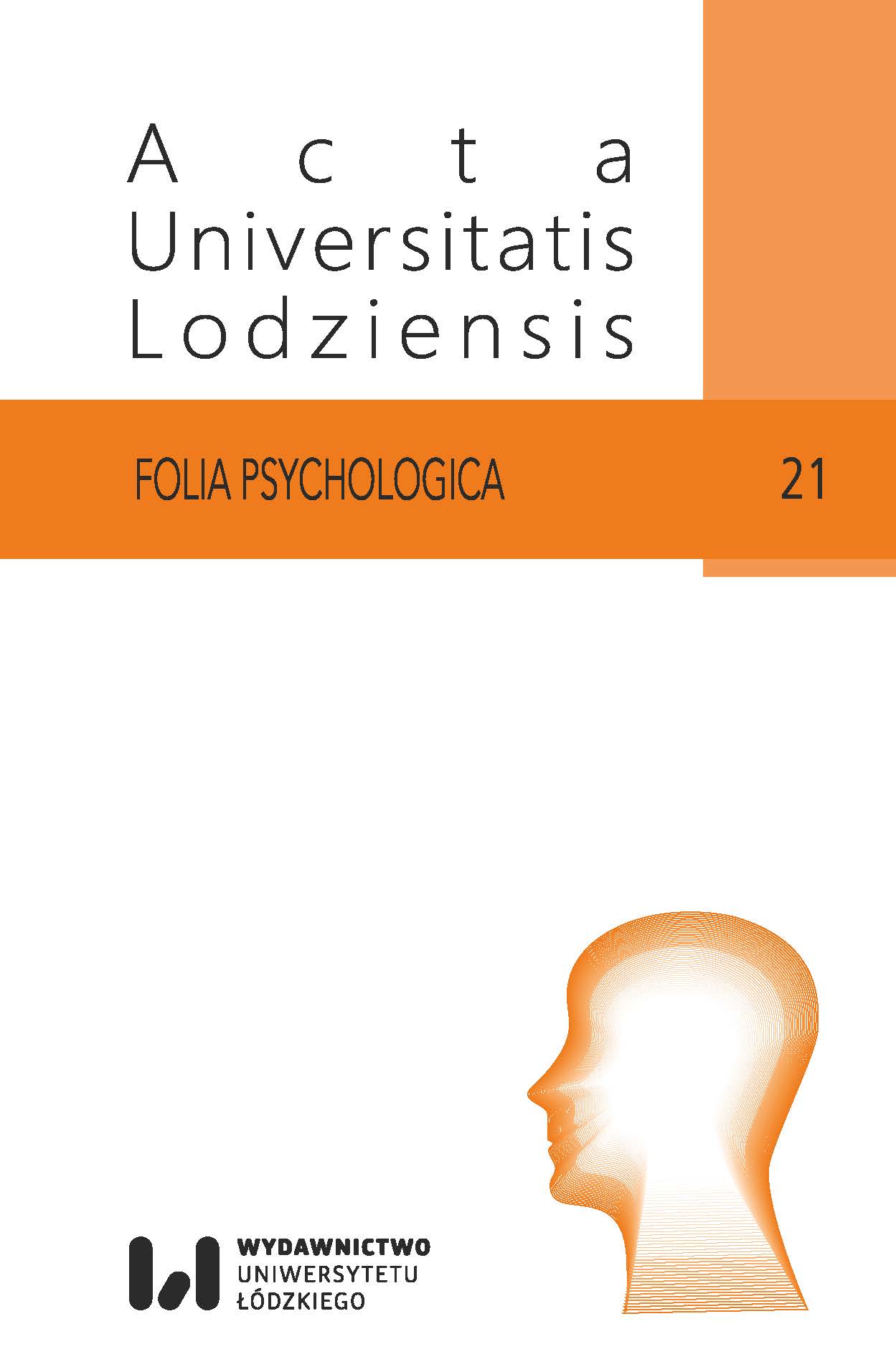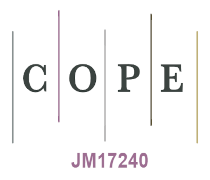Charakterystyka i ocena właściwości psychometrycznych polskiej adaptacji Skali Poczucia Kompetencji Rodzicielskich (Parenting Sense of Competence Scale – PSOC-PL) w wersji dla matek
DOI:
https://doi.org/10.18778/1427-969X.21.06Słowa kluczowe:
kompetencje rodzicielskie, skuteczność, satysfakcja, walidacja, PSOC – wersja polskaAbstrakt
Celem opracowania jest ocena właściwości psychometrycznych polskiej wersji Skali Poczucia Kompetencji Rodzicielskich (Parenting Sense of Competence Scale – PSOC-PL) Johnson i Masha do pomiaru kompetencji rodzicielskich u matek dzieci do 2. roku życia. Parenting Sense of Competence Scale jest narzędziem samoopisu. Zawiera 17 twierdzeń składających się na wynik ogólny oraz dwa wymiary: Satysfakcja i Skuteczność. Służy do oceny kompetencji rodzicielskich. W badaniach adaptacyjnych wzięło udział 251 kobiet mających dzieci w wieku do 24. miesiąca życia. Średni wiek badanych to 29,35 lat (SD = 4,57). Dodatkowo do oceny trafności polskiej wersji adaptowanego narzędzia wykorzystano Kwestionariusz Poczucia Stresu i Edynburską Skalę Depresji Poporodowej. PSOC-PL jest rzetelnym i trafnym narzędziem. Jego struktura czynnikowa jest podobna do wersji oryginalnej – w efekcie przeprowadzonej analizy uzyskano narzędzie, które składa się z 15 itemów. Tak jak w wersji oryginalnej, wyodrębnione zostały dwa wymiary: Satysfakcja i Skuteczność. Wyniki przy użyciu PSOC-PL uzyskane w prezentowanych badaniach pozostawały w istotnych statystycznie korelacjach z poziomem stresu i nasileniem objawów depresyjnych. Rezultaty rzetelności PSOC-PL nie odbiegają od wyników uzyskanych w badaniach oryginalnych, jak i w badaniach ewaluacyjnych prowadzonych w różnych częściach świata. Polska wersja narzędzia spełnia podstawowe kryteria psychometryczne i może być stosowana do oceny kompetencji u matek małych dzieci.
Bibliografia
Argyle M. (2004). Psychologia szczęścia. Wrocław: Wydawnictwo Astrum
Google Scholar
Bandura A. (1977). Self-efficacy: Toward a unifying theory of behavioural change. Psychological Review, 84, 191‒215
Google Scholar
Bandura A. (1997). Self-Efficacy: The Exercise of Control. New York, NY: W. H. Freeman and Company
Google Scholar
Beck C. T., Indman P. (2005). The many faces of postpartum depression. Journal of Obstetrics and Gynecology Neonatal Nursing, 34 (5), 569–576
Google Scholar
Begle A. M., Dumas J. E. (2011). Child and parental outcomes following involvement in a preventive intervention: Efficacy of the PACE program. The Journal of Primary Prevention, 32, 67–81. doi: 10.1007/s10935-010-0232-6
Google Scholar
Bloomfield L., Kendall S. (2012). Parenting self-efficacy, parenting stress and child behavior before and after a parenting programme. Primary Health Care Research & Development, 13, 364–372. doi: 10.1017/S1463423612000060
Google Scholar
Caldwell J. G., Shaver P. R., Li C.-S., Minzenberg M. J. (2011). Childhood maltreatment, adult attachment, and depression as predictors of parental self- efficacy in at-risk mothers. Journalof Aggression, Maltreatment and Trauma, 20, 595–616. doi: 10.1080/10926771.2011.595763
Google Scholar
Coleman P. K., Karraker K. H. (2000). Parenting self-efficacy among mothers of school-age children: Conceptualization, measurement, and correlates. Family Relations, 49 (1), 13–24. doi: 10.1111/j.1741-3729.2000.00013.x
Google Scholar
Cox J. L., Holden J. M., Sagovsky R. (1987). Detection of postnatal depression. Development of the 10-item Edinburgh postnatal depression scale. British Journal of Psychiatry, 150, 782–786
Google Scholar
Czapiński J. (2004). Psychologia pozytywna. Warszawa: Wydawnictwo Naukowe PWN
Google Scholar
Czub M. (2003). Znaczenie wczesnych więzi społecznych dla emocjonalnego rozwoju dziecka. Forum Oświatowe, 2 (29), 31–49
Google Scholar
Diener E., Lucas R. E., Oishi S. (2002). Subjective well-being: The science of happiness and life satisfaction. W: C. R. Snyder, S. J. Lopez (eds.), Handbook of positive psychology (s. 63–73). Oxford: Oxford University Press
Google Scholar
Gibaud-Wallston J. (1977). Self-esteem and situational stress factors related to sense of competence in new parents. Unpublished doctoral dissertation, University of Rhode Island, Providence
Google Scholar
Gibaud-Wallston J., Wandersman L. P. (1978). Development and utility of the parental sense of competence. Paper presented at the meeting of the American Psychological Association, Toronto
Google Scholar
Gilmore L., Cuskelly M. (2009). Factor structure of the Parenting Sense of Competence Scale using a normative sample. Child: Care, Health and Development, 35 (1), 48–55. doi:10.1111/j.1365-2214.2008.00867
Google Scholar
Jackson A. P. (2000). Maternal self-efficacy and children’s influence on stress and parenting among single black mothers in poverty. Journal of Family Issues, 21, 3–16. doi:10.1177/019251300021001001
Google Scholar
Jankowski K., Zajenkowski M. (2009). Metody szacowania rzetelności testu. W: Psychometria – podstawowe zagadnienia (s. 84–110). Warszawa: Vizja Press
Google Scholar
Johnston C., Mash E. J. (1989). A measure of parenting satisfaction and efficacy. Journal of Clinical Child Psychology, 18 (2), 167–175. doi: 10.1207/s15374424jccp1802_8
Google Scholar
Jones T., Prinz R. J. (2005). Potential roles of parental self efficacy in parent and child adjustment: A review. Clinical Psychology Review, 25 (3), 341–363. doi: 10.1016/j.cpr.2004.12.004
Google Scholar
Juczyński Z. (2000). Poczucie własnej skuteczności – teoria i pomiar. Acta Universitatis Lodziensis. Folia Psychologica, 4, 11–24
Google Scholar
Juczyński Z. (2001a). Narzędzia pomiaru w promocji i psychologii zdrowia. Warszawa: Polskie Towarzystwo Psychologiczne
Google Scholar
Juczyński Z. (2001b). Zachowania zdrowotne i wartościowanie zdrowia. W: Narzędzia pomiaru w promocji i psychologii zdrowia (s. 112–122). Warszawa: Pracownia Testów Psychologicznych
Google Scholar
Karp S. M., Lutenbacher M., Wallston K. A. (2015). Evaluation of the Parenting Sense of Competence Scale in Mothers of Infants. Journal of Child and Family Studies, 24 (11), 3474–3481. doi: 10.1007/s10826-015-0149-z
Google Scholar
Kohlhoff J., Barnett B. (2013). Parenting self-efficacy: Links with maternal depression, infant behaviour and adult attachment. Early Human Development, 89, 249–256. doi:10.1016/j.earlhumdev.2013.01.008
Google Scholar
Nunes C., Jiménez L., Menéndez S., Ayala-Nunes L., Hidalgo V. (2016). Psychometric properties of an adapted version of the parental sense of competence (PSOC) scale for Portuguese at-risk parents. Child & Family Social Work, 21, 433–441. doi: 10.1111/cfs.12159
Google Scholar
Plopa M., Makarowski R. (2010). Kwestionariusz Poczucia Stresu. Warszawa: Vizja Press & It.
Google Scholar
Raikes H. A., Thompson R. A. (2005). Efficacy and social support as predictors of parenting stress among families in poverty. Infant Mental Health Journal, 26 (3), 177–190. doi:10.1002/imhj.20044
Google Scholar
Shumow L., Lomax R. (2002). Parental self-efficacy: predictor of parenting behaviour adolescent outcomes. Parenting, Science and Practice, 2, 127–150. doi: 10.1207/S15327922PAR0202_03
Google Scholar
Teti D. M., Gelfand D. M. (1991). Behavioural competence among mothers of infants in the first year: The mediational role of maternal self-efficacy. Child Development, 62, 918–929. doi: 10.1111/j.1467-8624.1991.tb01580.x
Google Scholar
Walęcka-Matyja K., Kurpiel D. (2015). Satysfakcja z życia a poczucie skuteczności i styl wychowania w percepcji matek młodzieży z niepełnosprawnością. Psychologia Rozwojowa, 20 (1), 75–89. doi:10.4467/20843879PR.15.004.3476
Google Scholar
Veenhoven R. (1991). Questions on happiness: Classical topics, modern answers, blind spots. W: F. Strack, M. Argyle, N. Schwarz (eds.), Subjective well-being. An interdisciplinary perspective (s. 7‒26). Oxford–Toronto: Pergamon Press
Google Scholar









